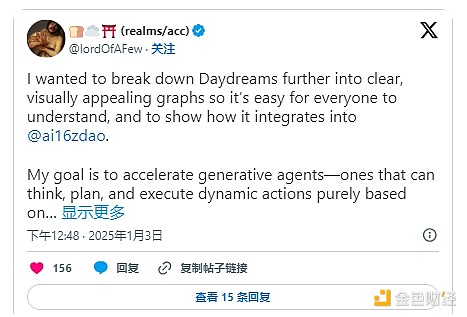
Author: William M. Peaster, Bankless; Compiled by: Tao Zhu, Golden Finance
Starknet, the mastermind behind some of the most important gaming innovations, is developing Daydreams, a platform designed to allow AI agents to A new system for playing any game on-chain.
So what do you need to know here? Let us take you through a quick tour.
What is DaydreamsLordofafew, also known as Loaf, is the founder of on-chain gaming infrastructure provider Cartridge and the new on-chain MMO Eternum, and a major contributor to ai16z's Eliza codebase, which is One of the most popular AI agent launch platforms today.
In a recent X post, Loaf highlighted how Daydreams will work within the context of the Eliza framework.
In the Eliza v1 architecture, the configuration file determines the personality of the agent, the database provides memory, runtime coordination logic, discrete plugins (such as for tweeting or on-chain Actions) define all functionality - this means that the agent is limited to these predefined modules, and each client (such as X or Discord) only hosts the agent's interactions.
Having said that, Daydreams is a new generation agent library planned for the upcoming Eliza v2 release, which will be available as an optional plug-in to allow Eliza agents to dynamically "Think" rather than being restricted by predefined hard-coded operations like v1 systems.
Daydreams is being developed as part of the popular Dojo on-chain game engine stack on Starknet and will be chain-agnostic, i.e. able to interact with any on-chain game on any network.
Under the hood, the Daydreams plugin will employ a "layered mission network" approach, constantly updating as the agent works towards its goal - such as conquering Eternum, or over the course of several days Or optimize DeFi strategies in a few weeks, etc.
The agent's memory is driven by so-called vector embeddings, storing each "strand of ideas" that can then be shared with other agents through a swarm mechanism for collective learning. This paves the way for long-term tasks, in other words, the success of one agent will lead to successful strategies for other agents in the swarm.
The Importance of DaydreamsEliza v2 agents powered by Daydreams will become dynamic problem solvers, able to adapt, evolve, and even create specialized code for new scenarios on the fly. Therefore, they are ideally suited to thrive as on-chain gaming agents.
In addition, with Daydreams integrated into the Dojo engine, developers will soon have access to a streamlined toolkit to build the next generation of AI players that can handle everything from exploration and resource management to alliances and warfare in any on-chain game. This plug-and-play dynamic should be extremely powerful and help solidify on-chain gaming as one of the next great frontiers of AI agents.
First Eliza Game ExperimentLoaf has said that the next season of Eternum aims to have at least 1,000 Daydreams-powered agent players participating in the game. These agents are not non-player characters (NPCs), but actual participants in the game world, capable of fighting independently or in cooperation with human players.
This is just a microcosm of the future of the on-chain gaming scene involving Eliza’s agency. Other projects, such as Treasure's SMOL life simulation RPG, Nifty Island multiplayer platform, and Hyperfy metaverse, are currently experimenting with Eliza technology, and more games are set to follow suit. Please stay tuned.
What happens nextHow will humanity adapt to a post-Daydreams world?
I speculate that it will become more and more common for players and guilds to launch their own game agents to serve them, accumulate resources, etc. without the need for active management.
For example, consider the possibility of accessing a marketplace of virtual game assets within the Metaverse project. You can take your Daydreams-powered agent with you, leverage the learnings and resources it gains from interacting with other games and DeFi protocols, and rely on it to trade on your behalf based on your existing strategies.
This memory system and game hopping, which takes learning and resources from one on-chain environment and brings those insights and assets to another on-chain environment, is particularly important for open chains like Realms World This is especially important for the gaming ecosystem, as it allows for interoperability between different franchises.
Similarly, we may see many Daydreaming Eliza agents coalesce around ecosystem tokens such as Realms World's native $LORDS token or Smolverse's $SMOL as the primary token for their digital venues. currency.
Of course, there is also the issue of peers, or if you prefer, competition. The upcoming Parallel Colony AI game will use the Wayfinder protocol, a cross-chain universal framework for deploying on-chain AI agents, much the same as Daydreams.
Personally, I think Daydreams and WayfinderBoth approaches have a bright future, although their architecture is definitely different - for example, Daydreams is not centered around token economics, while Wayfinder is centered around the $PRIME and $PROMPT tokens. It will be interesting to see how these different approaches develop in terms of market share in the coming years.
But whatever happens, it seems to me that we are on the cusp of a fundamental shift in gaming, and Daydreams is the latest harbinger of the boom to come at the intersection of on-chain gaming and AI agents. A new virtual society is coming, and the fun has just begun.











